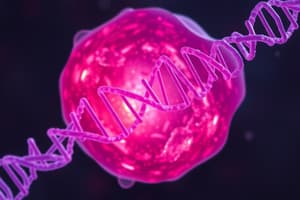Podcast
Questions and Answers
What is the main function of the nucleus in a cell?
What is the main function of the nucleus in a cell?
- To synthesize proteins
- To regulate cell signaling
- To store genetic material (correct)
- To control the movement of molecules in and out of the cell
What is the site of ribosome synthesis in the cell?
What is the site of ribosome synthesis in the cell?
- Nuclear matrix
- Cytoplasm
- Chromatin
- Nucleolus (correct)
What is the main component of cytoplasm?
What is the main component of cytoplasm?
- Salts
- Water (correct)
- Proteins
- Sugars
What is the function of the cell membrane?
What is the function of the cell membrane?
What is the process of cell division that results in two daughter cells with the same number of chromosomes as the parent cell?
What is the process of cell division that results in two daughter cells with the same number of chromosomes as the parent cell?
What is the stage of mitosis where chromatin condenses and the nuclear envelope breaks down?
What is the stage of mitosis where chromatin condenses and the nuclear envelope breaks down?
What is the function of the nuclear matrix?
What is the function of the nuclear matrix?
What is the primary component of the cell membrane?
What is the primary component of the cell membrane?
What is the function of the nucleolus in the nucleus?
What is the function of the nucleolus in the nucleus?
What is the role of cytoplasm in the cell?
What is the role of cytoplasm in the cell?
Flashcards are hidden until you start studying
Study Notes
Nucleus
- Control center of the cell
- Contains most of the cell's genetic material (DNA)
- Surrounded by a double membrane called the nuclear envelope
- Has pores that allow molecules to pass through
- Consists of:
- Nucleolus: site of ribosome synthesis
- Chromatin: complex of DNA and proteins
- Nuclear matrix: network of proteins and filaments
Cytoplasm
- Jelly-like substance inside the cell membrane
- Site of many metabolic processes, including:
- Protein synthesis
- Cell signaling
- Cell division
- Composed of:
- Water (about 70%)
- Salts
- Sugars
- Amino acids
- Organelles (e.g. mitochondria, ribosomes)
- Plays a key role in cellular processes, such as:
- Cell movement
- Muscle contraction
- Cell signaling
Cell Membrane
- Thin, semi-permeable membrane surrounding the cell
- Regulates what enters and leaves the cell
- Composed of:
- Phospholipid bilayer: phospholipid molecules with hydrophilic heads and hydrophobic tails
- Embedded proteins: transport, signaling, and structural proteins
- Functions:
- Controls the movement of molecules in and out of the cell
- Maintains cell shape and structure
- Provides protection and support
Mitosis
- Process of cell division that results in two daughter cells with the same number of chromosomes as the parent cell
- Consists of several stages:
- Interphase: cell grows, replicates DNA, and prepares for cell division
- Prophase: chromatin condenses, nuclear envelope breaks down, and spindle fibers form
- Metaphase: chromosomes line up at the center of the cell
- Anaphase: sister chromatids separate and move to opposite poles
- Telophase: nuclear envelope reforms, and chromosomes uncoil
- Cytokinesis: cytoplasm divides, and cell splits into two daughter cells
Cell Division
- Process by which a cell becomes two or more cells
- Types:
- Mitosis: results in two daughter cells with the same number of chromosomes as the parent cell
- Meiosis: results in four daughter cells with half the number of chromosomes as the parent cell (gametes)
- Importance:
- Growth and development
- Tissue repair and replacement
- Formation of gametes for reproduction
Cell Structure
- Nucleus is the control center of the cell and contains most of the cell's genetic material (DNA)
- Nuclear envelope is a double membrane that surrounds the nucleus and has pores that allow molecules to pass through
- Nucleolus is the site of ribosome synthesis
- Chromatin is a complex of DNA and proteins
- Nuclear matrix is a network of proteins and filaments
Cytoplasm
- Cytoplasm is a jelly-like substance that makes up about 70% of the cell's volume
- It is the site of many metabolic processes, including protein synthesis, cell signaling, and cell division
- Cytoplasm is composed of water, salts, sugars, amino acids, and organelles like mitochondria and ribosomes
- It plays a key role in cellular processes, such as cell movement, muscle contraction, and cell signaling
Cell Membrane
- Cell membrane is a thin, semi-permeable membrane that regulates what enters and leaves the cell
- It is composed of a phospholipid bilayer with hydrophilic heads and hydrophobic tails and embedded proteins
- The cell membrane controls the movement of molecules in and out of the cell, maintains cell shape and structure, and provides protection and support
Cell Division
- Mitosis is the process of cell division that results in two daughter cells with the same number of chromosomes as the parent cell
- It consists of several stages: interphase, prophase, metaphase, anaphase, telophase, and cytokinesis
- Cell division is important for growth and development, tissue repair and replacement, and the formation of gametes for reproduction
- There are two types of cell division: mitosis and meiosis, which results in four daughter cells with half the number of chromosomes as the parent cell
Studying That Suits You
Use AI to generate personalized quizzes and flashcards to suit your learning preferences.




